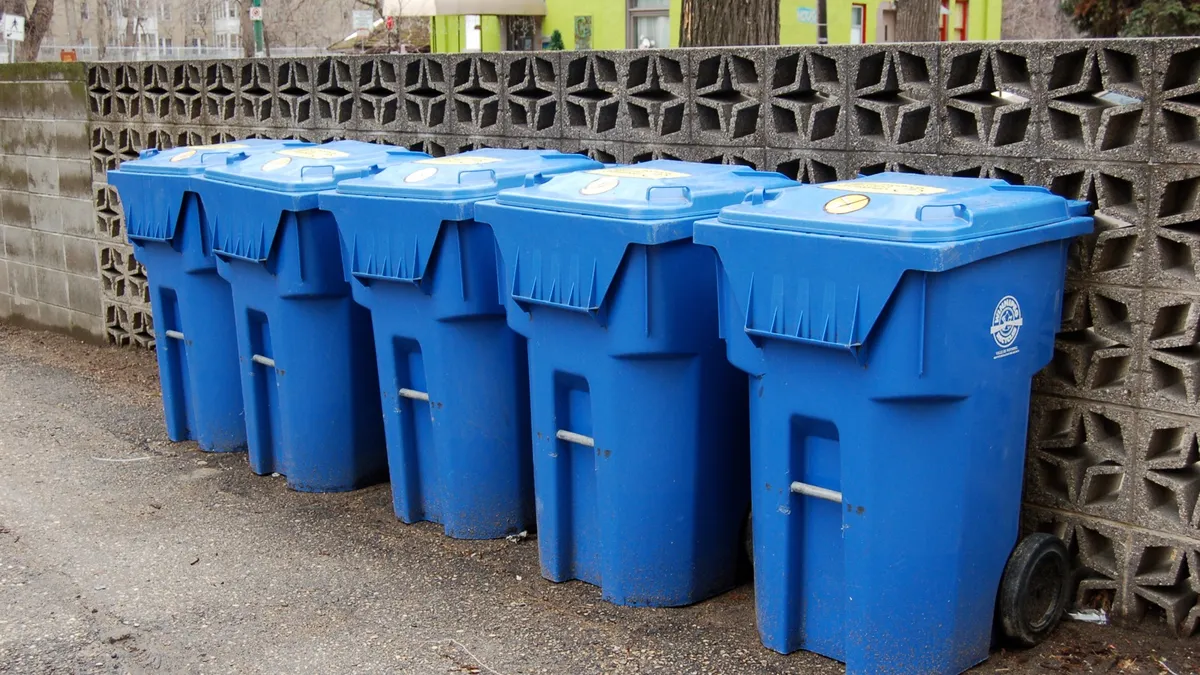Dive Brief:
- Recycling contracts with some form of revenue-sharing or fee-based model are here to stay, according to three executives from Waste Management, Republic Services and Casella Waste Systems during a Aug. 30 session at the Resource Recycling Conference. "We can’t continue to live where you’re underwater for years on end with the contract. We’re just not going to do that anymore," said Pete Keller, Republic's vice president of recycling and sustainability.
- The panel also agreed that franchise contracts may be one of the best ways to achieve high recycling targets set by cities. "I think there's a lot of benefits, for a city, to move toward a franchise system," said Susan Moulton, public sector sales director for Waste Management, noting the potential for cities to require cleaner vehicles and earn revenue from franchise fees.
- The importance of building relationships with municipalities and customers through longer exclusive contracts was also emphasized, and was seen as particularly important in terms of reducing contamination through education. Bob Cappadona, a vice president with Casella, said customers can hold their service providers more accountable this way and have better quality MRF operations in return. “These are not easy facilities to run," he said. "They are more sophisticated than they ever were."
Dive Insight:
Even before the latest news from China raised concerns about meeting tough commodity specs and weathering price shifts, many big companies had already begun the process of reworking their contracts to mitigate future risk. The CEOs of all three companies represented have been promoting this revenue sharing or fee-based approach in recent months as a result. This may limit some of the profit potential from commodity spikes, but also reduces the risk during declines.
Longer term franchise contracts are part of this equation, but the concept is still controversial in some markets. In Los Angeles, where both Waste Management and Republic are part of the new RecycLA franchise system, the initial roll-out has led to price spikes for many customers. Proposals to bring similar systems to cities such as New York or St. Paul, MN have also sparked much debate. These systems often face opposition from smaller regional or local haulers, as well as trade associations, but are seen as a lucrative option for larger companies that are equipped to service them. Whether customers are better served by franchise contracts or an open market system depends on whom you ask. Keller said Los Angeles "would never be able to achieve the things that they want to achieve" without franchise contracts.
Newer companies such as Rubicon Global have taken the opposite approach by fighting for open market systems that allow them to grow. These technology platforms ostensibly give smaller independent companies a chance to service bigger contracts they couldn't otherwise compete for, offering customers better prices and more customizable service. The larger companies of course disagree with this premise and both sides have been engaging in fierce competition as a result. When the panelists were asked about Rubicon specifically, they offered similar responses on how the company doesn't own physical assets and how their technology isn't unique. "All of us up here can provide the same value," said Moulton, who said Rubicon's main distinction is being "incredible marketers."
The growth of franchise systems may be helped by continuing industry consolidation and new municipal sustainability targets that require more upfront capital to achieve. If some commodity prices remain unpredictable, or take a hit due to Chinese policy, that could further bolster larger companies' argument for the stability of a long-term deal. Though based on the response so far, some of the newer technology companies and smaller service providers shouldn't be expected to let this happen quietly.












